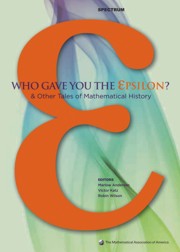Book contents
- Frontmatter
- Introduction
- Contents
- Analysis
- Foreword
- Who Gave You the Epsilon? Cauchy and the Origins of Rigorous Calculus
- Evolution of the Function Concept: A Brief Survey
- S. Kovalevsky: A Mathematical Lesson
- Highlights in the History of Spectral Theory
- Alan Turing and the Central Limit Theorem
- Why did George Green Write his Essay of 1828 on Electricity and Magnetism?
- Connectivity and Smoke-Rings: Green's Second Identity in its First Fifty Years
- The History of Stokes' Theorem
- The Mathematical Collaboration of M. L. Cartwright and J. E. Littlewood
- Dr. David Harold Blackwell, African American Pioneer
- Afterword
- Geometry, Topology and Foundations
- Algebra and Number Theory
- Surveys
- Index
- About the Editors
Foreword
from Analysis
- Frontmatter
- Introduction
- Contents
- Analysis
- Foreword
- Who Gave You the Epsilon? Cauchy and the Origins of Rigorous Calculus
- Evolution of the Function Concept: A Brief Survey
- S. Kovalevsky: A Mathematical Lesson
- Highlights in the History of Spectral Theory
- Alan Turing and the Central Limit Theorem
- Why did George Green Write his Essay of 1828 on Electricity and Magnetism?
- Connectivity and Smoke-Rings: Green's Second Identity in its First Fifty Years
- The History of Stokes' Theorem
- The Mathematical Collaboration of M. L. Cartwright and J. E. Littlewood
- Dr. David Harold Blackwell, African American Pioneer
- Afterword
- Geometry, Topology and Foundations
- Algebra and Number Theory
- Surveys
- Index
- About the Editors
Summary
In this chapter, we look at some critical ideas in the history of analysis in the nineteenth and twentieth centuries and also consider some of the people involved in their creation.
Certainly, the most important idea in the rigorous study of calculus is the idea of a limit. Although Newton and Leibniz both understood this idea heuristically and used it in their discussions of fluxions and differentials, respectively, it was not until the nineteenth century that our modern treatment in terms of epsilons and deltas was created, mostly by Augustin-Louis Cauchy. Judy Grabiner explores this creation in her article, showing how Cauchy took the ideas of approximation worked out by d'Alembert, Lagrange, and others in the eighteenth century and turned them into the foundations of the rigorous definitions of the central concepts of calculus, including limit, continuity, and convergence.
Today, functions are the basic objects studied in calculus, although they were not so for Newton and Leibniz. Israel Kleiner surveys the history of this concept, showing how some of the vague ideas of the creators of calculus were turned into precise definitions by Euler and others. He continues by discussing how the notion of function developed under the influence of the development of Fourier series and then was further affected by the invention of various pathological functions in the second half of the nineteenth century. Kleiner concludes with a treatment of the various extensions of the notion of function in the twentieth century, including L2 functions and distributions.
- Type
- Chapter
- Information
- Who Gave You the Epsilon?And Other Tales of Mathematical History, pp. 3 - 4Publisher: Mathematical Association of AmericaPrint publication year: 2009

